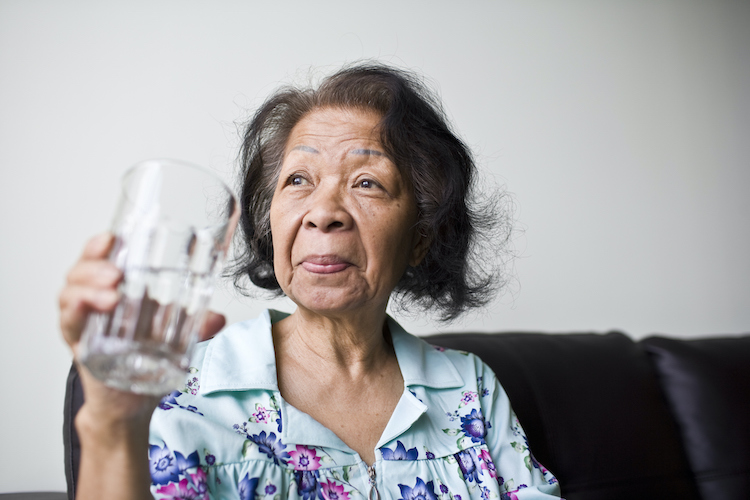
Preventing dehydration in the elderly is easier with these tips.
During the warmest time of the year, keeping up with proper hydration is crucial, particularly for senior loved ones. As a matter of fact, close to 50% of all older adults are chronically under-hydrated, as outlined by a recently available UCLA research study, which can lead to a number of health risks, such as kidney stones, urinary tract infection, and also a greater risk for falls.
The frequency of dehydration in seniors is linked to a variety of factors, most notably:
- A diminished amount of water naturally in older bodies
- Medication side effects
- Less sensitivity toward the sensation of thirst
- A reduced capacity to maintain a proper fluid level balance in the body
- Decreased efficiency of the kidneys
- And much more
There is a quick calculation to determine exactly how much water older adults should drink each day. Take the individual’s body weight in pounds, and drink one-third that many ounces of water daily. Someone who weighs 120 pounds, for instance, should drink, at the very least, 40 ounces of water – about five 8-ounce glasses.
Time is critical in preventing dehydration in the elderly, as it’s a lot easier to correct mild dehydration prior to it becoming more severe. Symptoms include:
Mild Dehydration:
- Decreased, darker-colored urine
- Dry mouth
- Dizziness and fatigue
- Muscle cramping
- Irritability
- Headaches
Severe Dehydration:
- Disorientation and confusion
- Difficulty with walking
- Weak, fast pulse
- Low blood pressure levels
- Worsening of muscle cramps
- Sunken, dry eyes
- Skin that is wrinkled and has reduced elasticity
- Bloating
- Quickened breathing
- Convulsions
Seek out medical help as soon as possible if you suspect dehydration in an older adult, to avoid significant health complications that might develop rapidly.
If an older adult resists drinking enough water, try flavoring the water or offering juice, if it’s an appropriate part of the older adult’s dietary plan. For anyone with conditions such as diabetes or obesity, the sugar content in juice can be unsafe. Occasionally, adjusting the temperature of the beverage helps it to be more pleasing as well; for example, warming a cup of water along with a little lemon to sip on each morning, and then offering chilled water over crushed ice during the afternoon.
The key is to have fluids available throughout the day. Geriatric nurse Anne Vanderbilt, CNS, explains, “What I often see in our advanced older adults – people in their 80s and 90s – is that they can’t sit down and drink a full 8-ounce glass of water. It fills them up, causes bloating and then makes them have to run to the bathroom. So little sips throughout the day are better.”
In order to help make sure the older adults you love are staying hydrated and healthy, partner with Abby Senior Care for the best in home caregivers in Denver, CO and the surrounding communities. Our caregivers are on hand to help supervise fluid intake, prepare nutritious meals, encourage seniors to stay physically active, and so much more for optimal health. Email or call us at 303-699-8840 for a complimentary in-home evaluation and for more information! Visit our Service Area page to find care services near you.
